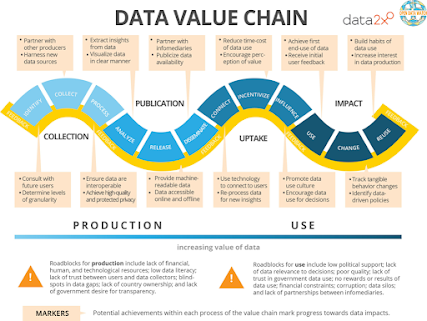Datafication- The Trend of Today
Datafication is one of the current
Technological trends, Kenneth Cukier and Viktor Mayer-Schönberger introduced
the term datafication to the broader lexicon in 2013.
So before understanding datafication let us
discuss DATA.
Data is defined as facts, figures, or
information that’s stored in or used by a computer.In today’s world, The
importance of data is increasing day by day. As, by analysing data many
predictions can be made using computational power. With technological
development now we are looking forward to Predicting much more using Data.
This is where Datafication comes into
picture, Basically Datafications is a Technological trend turning many aspects
of our life into data. This is done using processes to transform organisations
into data-driven enterprises by converting this information into new forms of
value. I.e Organisations working with Conventional methods are now adopting new
methods and using data in appropriate ways.
With the data readily available, companies
need enough levels of skilled professionals who can analyse and manage the
data, to ensure it is of the greatest benefit. It will create jobs in the areas
of data infrastructure, data management and data analytics.Organisations need
people who understand how to collect, store and analyse the data.
We are truly entering into the era of Big
Data. Datafication and its analytics is going to play an important role for
innovation and productivity in the future.
Many of us at the initial stage get
confused in Datafication and Digitization, As both of them seem to be similar
in some aspects, But datafication is fat broader than digitization.
Digitization refers to converting analog contents (such as books, films, photographs) to
digital information whereas datafication takes all aspects of life and turns
them into data.
New technologies have enabled lots of new
ways to “datify” our normal activities.
For Example,my exercise is now datified. I
went for a run this morning, and my smart device recorded exactly how long I
ran for, how many strides I took, and how many calories I burned in the
process. For the first time, it’s very easy for me to track and monitor my
exercise progress.And that’s just one small example. A lot of my daily activity
is now automatically tracked. My network of friends is now datified with
Facebook. My network of professional connections is datified with LinkedIn. My
location is datified with Foursquare. My latest random thoughts are datified on
Twitter. My music preferences are datified with Spotify.
Datafication helps organisations to improve
their product and services using data.
Similarly knowingly or unknowingly we are
generating a huge amount of data and organisations are working on using this
data in whichever way they can.
Datafication involves behind-the-scenes
operations and processes translating them into meaningful information to make
the business a fully data-driven operation. And with tools like artificial
intelligence (AI), machine learning (ML), the Internet of Things
(IoT), associated smart devices, and, of course, Big Data, it is becoming the
foundation of a business’ very success.
Benefits of Datafication
1.
Gain Insight into your process
Raw data itself is difficult to analyse,
But datafication transforms it into actionable insights. Using datafication you
will be able to understand you and your business (strengths, weaknesses,
potential, etc.) in a much better way..
2.
Facilitate Digital
Transformation
We can only take advantage of the latest
technologies if we have usable data. Datafication is the ticket to improving
our processes technologically. Once we understand where we are, we will be
better able to take the necessary steps to move forward and thrive through
innovation.
3.
Improve Efficiency
By using datafication we will have a proper
understanding of our business and we may make better use of our resources.
4.
Manage Information
As discussed before, we are generating
tremendous amounts of data and this data can serve us back or it can overwhelm
us, just depending on how we use it !
5.
Apply it across industries
Some of the examples of industries using
datafication are:
●
Human resources (HR): Data used
to identify e.g. employees risk-taking profiles.
●
Marketing and advertising
●
Customer relationship
management
●
Government
●
Real estate
●
Finance
●
Insurance: Data used to update
risk profile development and business models.
●
Retail
●
Research
●
Entertainment
●
Banking: Data used to establish
trustworthiness and likelihood of a person paying back a loan.
Blog Credits: Jiten Topiwala (Team TechTuesday)
References:
● https://www.datasciencecentral.com/the-concept-of-datafication-definition-amp-examples/
● https://nitsri.ac.in/Department/Computer%20Science%20&%20Engineering/DSL3.pdf
● https://www.forbes.com/sites/sap/2013/07/24/the-datification-of-daily-life/?sh=1f0728ae17f9
NOTE:-
This blog is meant for Educational purposes only. We do not own any Copyrights related to images and information; all the rights go to their respective owners. The sole purpose of this blog is to Educate, Inspire, Empower, and create awareness in the viewers. The usage is non-commercial(Not For Profit), and we do not make any money from it.
FOLLOW US ON:-
INSTAGRAM :
https://bit.ly/coep_blogs_insta
LINKEDIN:
https://bit.ly/coep_blogs_linkedIn
YOUTUBE:-




Comments
Post a Comment